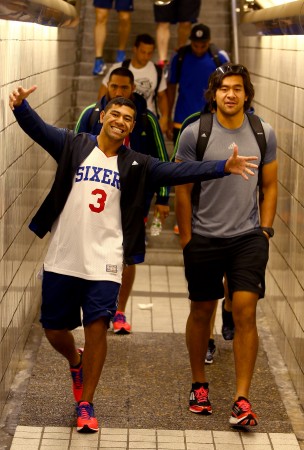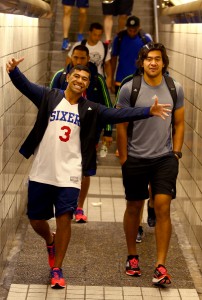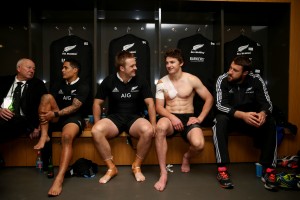
Already used to success: Flanker Steven Luatua celebrates winning the Bledisloe Cup with the All Black fans
By Charlie Morgan
Every year, the Barbarians’ stay at Grosvenor House in London coincides with Winter Wonderland, a smattering of festive fair-ground rides that take over part of Hyde Park, a leisurely stroll away.
Last week, the proximity of such revelry was apt for Steven Luatua. Immersed in a magical start to his Test career where losing must seem inconceivable, the shaggy-haired back-rower could not stop grinning. With new buddy Bismarck du Plessis in tow, he loped happily around the hotel like a kid at Christmas, exuding a charming appreciation of Barbarians tradition.
At 22 with 11 blemish-free caps already, Luatua personifies the outstanding generation flying into New Zealand’s front ranks. A disbelieving smile was still plastered in place on Saturday as Twickenham’s open expanses presented a perfect platform to showcase his best against Fiji. Racking up 12 carries for 90 metres, beating three defenders and making three more offloads, Luatua shone for the famous invitational side – not that the international arena has hampered him. Indeed, his first three All Blacks starts were so action-packed and accomplished that some were surprised to see Liam Messam return for the defeat of South Africa in September.
Seven more members of Steve Hansen’s touring party spent their weekend in the famous black and white hoops, Keven Mealamu a senior statesman among the hungry tyros. Four of them – Charles Piutau, Luke Whitelock, TJ Perenara and Dominic Bird – won the 2011 Junior World Championship with the Baby Blacks. There was also Tom Taylor, who made an assured Test bow in this year’s Bledisloe Cup. Frank Halai started on the Barbarians’ right wing, too. After a debut in Tokyo last month, it won’t be long before he is terrorising international defences more regularly.
There was perhaps a hint of bravado in the New Zealand Herald’s ominous assertion that their national team is getting younger, but there is substance to their Benjamin Button theory.
Four centurions and 959 caps punctuated the world champions’ squad to face England this autumn. Still, the average age of a side loaded with veterans was 26. Sam Whitelock, whose all-round excellence consistently sets him apart as the world’s premier lock, made his 50th appearance that day having only turned 25 a couple of weeks previously.
Whitelock’s engine-room partner Brodie Retallick has just finished his second season in Hansen’s ranks. Aided by a hulking frame, he is influencing big games – a gargantuan, try-scoring shift during the Springboks clash in Auckland the best example. It is not as if he is merely an enforcer either; how many times has he been the midfield link-man this year? He even stepped in at scrum half before Julian Savea’s second at HQ.
Another superb sophomore is Beauden Barrett – like Retallick a graduate of the 2011 Under 20 team handed his first taste of Tests last June in the series with Ireland. So far, he has had to make do with 14 of his 16 caps coming as a replacement. With a try and a last-gasp tackle to clinch that match at Ellis Park foreshadowing an equally game-breaking cameo in Dublin, Hansen must be giddy about what he could do over 80 minutes. For me, Barrett is Dan Carter’s natural successor, but having filled in at every position across the three-quarters – his first touch at Lansdowne Road was out-jumping Tommy Bowe to claim a cross-kick on the wing – he could probably choose which jersey he wants to inherit.
Success breeds success, and a set-up that has lost once in 34 Tests since the start of the 2011 Rugby World Cup (unthinkably, they went into that tournament on the back of consecutive defeats) is pretty sturdy. Even so, consistently seamless individual transitions are astounding. Two wonderful try assists – Piutau’s stunning cat-flap in Paris and an effort from hooker Dane Coles to break Irish hearts – required confidence and dexterity, two qualities instilled in newcomers from the outset thanks as much to Hansen’s environment as the intense, skill-led nature of the Super 15.
Championing swift promotions of Joe Launchbury and Marland Yarde among others, Stuart Lancaster is pursuing the same template – Anthony Watson could star in 2015. That said, his predecessors’ failure to build a legacy from the 2003 Webb Ellis win has had a knock-on effect.
While England’s average age was only a year younger than New Zealand’s when they last met, the hosts could boast a combined tally of 466 fewer international matches. A 38-20 reverse last December demonstrated the Kiwis can be vulnerable and that England will be contenders on home soil – next summer’s three-match series in the Land of the Long White Cloud should steel them further, too. However, the 2015 favourites tag will not be moving anywhere.
The 2011 World Cup was a foundation for the All Blacks to stop their habit of peaking in the middle of four-year cycles. This progression continues with innovative steps such as freakish 20 year-old openside Ardie Savea (brother of behemoth Julian) touring Europe as an “apprentice” and seeing how his elders have negotiated sticky situations – a ferocious resurgence from the England pack, Ireland’s eye-watering opening onslaught – at first-hand.
In his own blunt way, Hansen summed up world rugby in the week before his Twickenham vengeance. “England want to be second in the world,” he growled. “We’re number one and we want to get better.”
You could transpose any nation into England’s place in that quote with the exception of South Africa. Thanks to on-going faith in his precocious youth, Hansen is ensuring the chase will be a long one.







